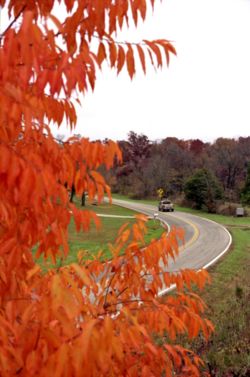Category:236 Right of Way: Difference between revisions
m Per RW, added leaflet |
mNo edit summary |
||
| Line 8: | Line 8: | ||
The control of access to a roadway is one of the key elements in determining the safety of highway improvement. It also serves to protect the public’s invest in a highway. Access to a roadway is dependent upon its functional classification. Major types of access are: | The control of access to a roadway is one of the key elements in determining the safety of highway improvement. It also serves to protect the public’s invest in a highway. Access to a roadway is dependent upon its functional classification. Major types of access are: | ||
*[[236.13 Designing Right of Way Plans#236.13 | *[[236.13 Designing Right of Way Plans#236.13.5.1 Normal Right of Way| Normal]] | ||
*[[236.13 Designing Right of Way Plans#236.13 | *[[236.13 Designing Right of Way Plans#236.13.5.2 Controlled Access|Controlled Access]] | ||
*[[236.13 Designing Right of Way Plans#236.13 | *[[236.13 Designing Right of Way Plans#236.13.5.4 Fully Controlled Access|Fully Controlled Access]] | ||
*[[236.13 Designing Right of Way Plans#236.13 | *[[236.13 Designing Right of Way Plans#236.13.5.5 Partial Controlled Access|Partial Controlled Access]] | ||
*[[236.13 Designing Right of Way Plans#236.13 | *[[236.13 Designing Right of Way Plans#236.13.5.6 No Right of Access|No Right of Access]] | ||
The use of these types of access control is important to ensure the roadway adequately serves the needs of the motorist and the community. | The use of these types of access control is important to ensure the roadway adequately serves the needs of the motorist and the community. | ||
Revision as of 09:32, 29 May 2019

Right of Way plans are developed together with the development of detailed construction plans. These two activities are defined as "final design". They occur after the preliminary plan for an improvement is approved. Right of Way plans define and dimension areas necessary to construct and maintain the main roadways and necessary outer roadways, entrances and crossroads. Areas for maintenance and utilities are also provided. Information on the Right of Way plans is sufficient to write deeds and describe the limits of the right of way.
The minimum width of right of way established for each project is that necessary to accommodate construction and provide proper maintenance of the roadway without an undue number of jogs in the right of way line.
The control of access to a roadway is one of the key elements in determining the safety of highway improvement. It also serves to protect the public’s invest in a highway. Access to a roadway is dependent upon its functional classification. Major types of access are:
The use of these types of access control is important to ensure the roadway adequately serves the needs of the motorist and the community.
Possession of the right of way is necessary before construction of a roadway improvement can begin. An important part of “clearing” the right of way is identifying and removing asbestos and hazardous materials. Often roadway improvements do not incorporate all of the existing roadway facility. When this occurs, ownership of the unused portion of the old roadway must be addressed. MoDOT achieves this transfer in one of several ways:
| Additional Information |
| The Outdoor Advertiser, a newletter for Right of Way customers |
| Right of Way Acquisition, an informative leaflet |
- Convey to a local government agency
- Convey to adjacent property owners or others
- Abandon the roadway
- Trade routes with a local government agency
In these cases, a Change in Route Status Report is developed to accomplish the transfer of ownership.
The acquisition of right of way for transportation improvements is a complex undertaking. All activities associated with this acquisition, including those applicable to title search, appraisal, negotiations, payments, closings, condemnation, possession and other related activities, shall be identical, and shall be identically applied in all dealings with property owners from whom lands, property or rights must be acquired for transportation purposes without regard to the owner’s race, color, religion, national origin, sex, age, ancestry or physical ability.
All MoDOT personnel who are involved in any phase of the effort to acquire right of way must fully understand these requirements and further understand they are accountable for noncompliance.
Right of Way personnel who contact property owners are also responsible for insuring all owners, including those with language or other communication difficulties, fully understand how the right of way acquisition process affects them.
Specific acquisition activities are described in the following categories:
- General Information
- Organization & Personnel
- Administration
- Description Writing & Titles
- Property Management
- Appraisal and Appraisal Review
- Negotiation
- Relocation
- Hazardous Materials
- Condemnation Procedures
- Mediation
- Quality Assurance
- Designing Right of Way Plans
- Change in Route Status Report
- Requests from Cities for Annexations
- Outdoor Advertising
- Junkyards
- Local Public Agency Land Acquisition
Federal regulations governing right of way acquisitions are found in 23 CFR (Code of Federal Regulations) and 49 CFR, Part 24. Compliance with these regulations are required if federal funds are used to finance any portion of the improvement project.
Articles in "236 Right of Way"
The following 18 pages are in this category, out of 18 total.
2
- 236.1 General Information
- 236.2 Right of Way Organization and Personnel
- 236.3 Administration
- 236.4 Description Writing and Titles
- 236.5 Property Management
- 236.6 Appraisal and Appraisal Review
- 236.7 Negotiation
- 236.8 Relocation Assistance Program
- 236.9 Asbestos Abatement-Removal of Building Improvement
- 236.10 Right Of Way Condemnation
- 236.11 Mediation
- 236.12 Quality Assurance Reviews
- 236.13 Designing Right of Way Plans
- 236.14 Change in Route Status Report
- 236.15 Requests from Cities for Annexations
- 236.16 Outdoor Advertising
- 236.17 Junkyards
- 236.18 Scenic Byways